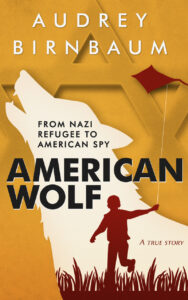
Briarcliff Manor resident Audrey Birnbaum has published a retelling of her father’s escape from Nazi Germany that’s also an immigration tale, a family drama and a coming-of-age story.
After the death of her father, Wolf Schwersenz, in 2018, Birnbaum came upon his notes detailing his escape from Berlin in 1941. She felt compelled to start writing what became American Wolf: From Nazi Refugee to American Spy, which was recently released by Amsterdam Publishers.
Birnbaum is mom to three grown children and first-time author following a career as a pediatric gastroenterologist, including at Mount Kisco Medical Group, now named Optum.
Here’s a Q&A with the author, which has been edited for brevity.
River Journal: Did your father speak to you about his experiences during the war, or were they a surprise when you came across his notes?
Audrey Birnbaum: We (my sister and I) both knew and didn’t know. On the one hand, we grew up knowing stories about my father’s history from the time we were very young, long before we could understand either the emotional impact or the historical significance. We were also bombarded with Holocaust documentaries from a very early age, so Nazism and the Holocaust were as familiar to us as Disney might be to a typical American child. There came a time in our childhood when it must have been assumed that we already heard my father’s stories and we simply stopped talking about his past.
But the truth is, we sort of knew, and at the same time, did not really know or understand anything except some specific stories, without continuity or context. And suddenly, at my father’s funeral, when we wanted to sum up this seminal period in his life, we became embarrassingly aware that we were missing all the key facets of his life story. Until we found his notes, it was like trying to unravel a dream.
RJ: There have been many books and movies about the Holocaust. What can a reader find in your account that reveals something new?

Birnbaum: American Wolf is more than an escape story, and more than a survival story, though it is certainly those things too. From a purely historic perspective, it has a unique focus on the many bureaucratic obstacles to Jewish emigration. It tells the story of my family’s desperate (and sometimes crazy) foiled plans to escape Germany as war was approaching.
It is the first book I know to tell about the Spanish freighter the Navemar, packed with 1,200 passengers, and aptly referred to as a “floating concentration camp,” on which hundreds of passengers developed dysentery and some died en route.
A unique characteristic of the book is that it describes the painful transition to life in America — an America that does not necessarily welcome immigrants with open arms. In this story, reaching freedom does not equate with happiness, and for some of the characters, the struggle for survival is just beginning. Lastly, my father’s return to Germany at the end of the book and its implications regarding his sense of identity is often not addressed in Holocaust “escape” literature.
RJ: What was your father’s experience as a spy?
Birnbaum: My father’s experience as a spy for the U.S. in the Cold War sent him back to Germany. It was his opportunity to face the country for which he was perversely homesick, while once again coming to terms with who he was…German, Jewish, American… or all of the above? It was also an exciting time in his life where he experienced danger and love, and first began to feel like a man.
RJ: How did you make the transition from being a doctor to an author?

Birnbaum: When I stopped practicing medicine I hadn’t set out to become an author. I simply found my father’s 350 pages of notes after he died, and I thought his story was extraordinary and worth telling. Turning his notes into a book was a big undertaking. I had always been a decent writer, but after medical school, my writing was limited to consult letters and academic papers. I was committed to getting American Wolf published not only as an homage to my Dad but because I believe Holocaust stories still need to be told in a personal way to keep people from forgetting that devastating period in history.
RJ: Do you have any upcoming local appearances?
Birnbaum: The Ossining Public Library has just bought copies. The reading date will be announced shortly. I will be doing a talk and signing on Feb. 13 at 7 p.m. at Congregation Sons of Israel in Briarcliff.
Visit audreybirnbaumauthor.com to learn more about American Wolf: From Nazi Refugee to American Spy.







